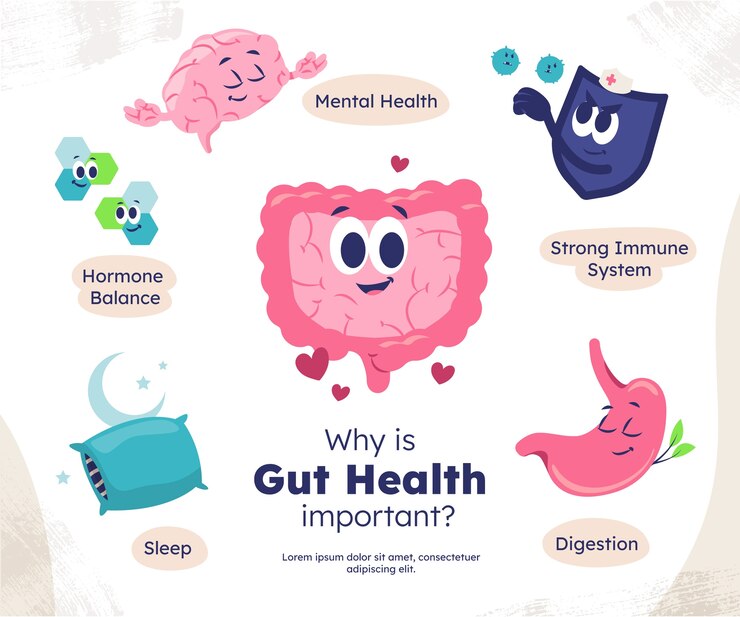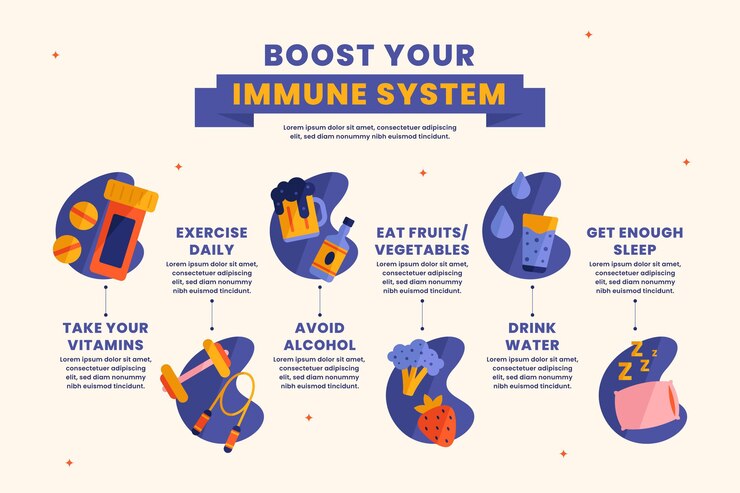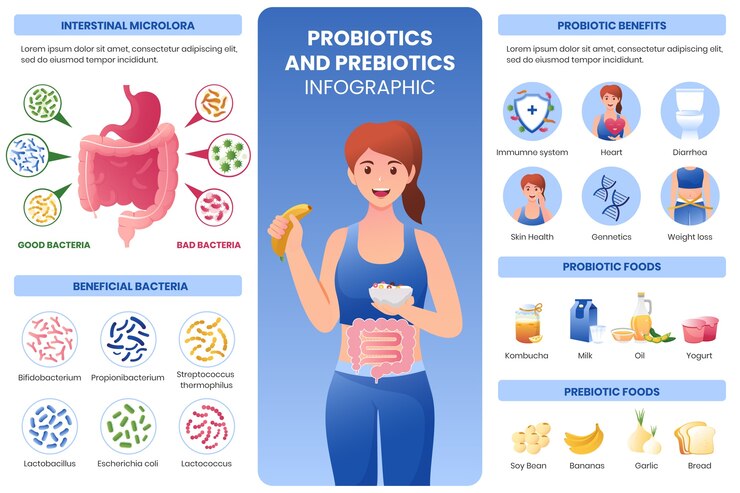
Gut Health
Table of Content
Microbial environment, or gut health, has recently become a popular primary concern of both specialists and the general public. But then we have a question: What exactly is “a healthy gut”, and why is it so essential to the wellbeing of all of us?
In this article the mysterious world of gut health will be examined, explaining its role in our health. Practical advice on how to ensure a vibrant microbiome will be offered.
What is Gut Health?
In recent years, the world has witnessed the rise of an industry centered on improving gut health, and its boom has been for every obvious reason. The activity of the intestine, once thought to focus solely on digestion, is now recognized as a complex ecosystem that significantly influences overall health.
The global probiotics market, a key component of the gut health industry, was valued at approximately $58.17 billion in 2021 and is projected to reach over $133.89 billion by 2030, according to Statista. This growth underscores the increasing awareness of the gut's role in immunity, mental health, and chronic disease prevention.
Gut health becomes a multi-faceted concept when the gut microbiome—a colony of bacteria, viruses, and fungi primarily located in the large intestine—takes center stage. It’s this delicate balance of microorganisms that drives many essential processes in the body, from digestion to mental well-being.
The Importance of a Healthy Gut

Digestive Efficiency
-
It is common sense that an intact gut plays a vital role in normal digestibility and nutrient utilization, which spares many unpleasant intestinal disorders such as bloating, intestinal gasses, constipation and diarrhea.
-
The gut microbiota allows for the breakdown and digestion of complex compounds such as carbohydrates and fibers, this helps the body in the proper absorption of vital nutrients.
Immune Function
-
An amazing 70% of the immune system is retained in the gut. The equilibrium of the probiotics for the gut health bacterial community helps the body achieve its immunological advantage over pathogens.
-
Such bacteria that are living in the gut are thought to be big helpers in the training of the immune system in order to be ready to fight diseases and/or autoimmune responses.
Mental Health
-
The gut-brain connection is a vital factor in the regulation of relaxation and ill-mental health.
-
The gut and microbiome create neurotransmitters, including serotonin (entering the bloodstream), which helps to control the brain cells' function.
-
Serotonin is said to have a positive impact on the level of emotions and mood while improving the uptake of nutrients.
-
The role of having a healthy gut in providing relief from stress-related and mood disorders like anxiety, depression through maintenance of the balance of these chemicals and through reducing inflammation, which is a proven cause of depression and other mood disorders, cannot be denied.
Weight Management
-
Gut bacteria can actually make your body store fat, trap sugar in the blood, and have feelings of hunger or fullness, as these are all aspects regulated by the gut bacteria and are important in weight management.
-
Certain bacteria take more energy from the food you eat, so it is easier to assimilate in your body and contribute to weight gain, while others regulate metabolic functions and appetite.
-
By enriching the good bacteria population, a healthy microbiome not only facilitates but also promotes weight loss or the maintenance of healthy body mass.
Chronic Disease Prevention
-
A proper gut shifts the possibility of developing chronic diseases such as diabetes, heart diseases and different types of cancer into lower realities.
-
Microbiota of the gastrointestinal system takes part in systemic inflammation, insulin sensitivity and lipid metabolism – the features which can lead to onset of chronic pathologies.
-
Through a well inhabited intestine, you can have a decreased inflammation level and enhanced metabolic health that will considerably reduce the likelihood of those conditions.
-
Gut health becomes a multi-faceted concept when the gut microbiome, a colony of bacteria, viruses, and fungi existing predominantly in the large intestine, is at the very center of it.
Signs of an Unhealthy Gut
Now that we've looked at the giant influence of a healthy digestive tract, this is where things get cool. Anymore, but a question arises, is your gut off balance? While some gut issues are common and occasional, a persistent presence of these signs may indicate an unhealthy gut:
-
Digestive Distress on Repeat: Bloating, gas, sluggishness, and diarrhea are among the symptoms of an unhappy stomach. Maybe these discomforts are your buddies but if they come along so frequently, it is high time to have a deeper look at your gut health.
-
Unexplained Fatigue: You are cranky even though you had a full night of rest? A sluggish intestine can indeed restore your vitality. Hosts gut microbiome may be functionally disrupted which lead to malabsorption of nutrients and as a result you may feel fatigued.
-
Skin Woes: From a scientific viewpoint the gut-skin connection exists as an established fact. Research shows patients suffering from eczema combined with acne and psoriasis tend to have microbiome imbalance in their gut that results in higher disease risks. Statista reports that the global market for skincare products reached $136 billion in 2022 while forecasted to hit $189 billion by 2027 because consumers increasingly want to understand what affects their skin health both internally and externally. The increased understanding about how gut health ties to skin conditions has led to a rapid expansion of products and solutions focused on the gut-skin relationship.
-
Food Sensitivities: Are you prone to suffer from digestive problems such as bloating or other kinds of reactions after eating particular foods? The fact that you keep experiencing food intolerances is likely attributed to a problem with the natural flora in your gut healthy foods.
-
Prone to Infections: The extent of the healthy gut microbiome leads to reinforcement of immunity. If there are times that you notice being chronically unwell with frequent infections, it could be that your gut needs your attention.
-
Mood Swings and Mental Health: The gut-brain axis is a most interesting neurological tract. Research has a probability of evidence for the association between an imbalanced gut microbiome and moodiness, anxiety, or even depression.
Recall that it may be a result of different causes, too. If you are battling ellipticities of bowel cautiously, it is better to have a discussion with your health care provider to identify the underlying problem.
7 Steps to Improve Gut Health
Now that we understand the importance of improve gut health and the warning signs of an imbalance, let's delve into actionable steps you can take to cultivate a flourishing gut microbiome: Now that we understand the importance of gut health and the warning signs of an imbalance, let's delve into actionable steps you can take to cultivate a flourishing gut microbiome:

-
Embrace Diversity on Your Plate: The happiness of our gut bacteria is the result of an ample alternative diet. To create a rainbow pattern in your plate, add plenty of colorful fruits, vegetables, legumes, whole grains, and other essentials to your daily meals. These green foods, as most people know, contain a lot of fiber which is recognized as probiotics in your gut, the good bacteria that flourishes and grows.
-
Probiotics and Prebiotics: An Amazing Duo: best probiotics for gut health, which refer to live beneficial bacteria that are naturally found in fermented foods products like yogurt, kefir, sauerkraut, and kimchi, add good bacteria to the gut. Prebiotics, the insoluble fibers present in garlic, onion, banana, and asparagus are good for your gut because they act as a fuel for your existing beneficial bacteria to stimulate their growth and their activity.
-
Limit Processed Foods and Sugars: The bad bacteria in the gut feasts at high-processed foods with added sugars just like fast food floats on gasoline. They can do harm to the gut flora, which disturbs the normal situation when the digestive system is favoring the development of bad bacteria. Prefer whole foods which are unprocessed if you can, and reduce the number of processed sweets or beverages you consume.
-
H2O: Friend and Home of Your Gut: One shouldn't go without water since it plays a key role for our overall health and especially for your gut. Drinking plentiful water is necessary because it hydrates the mucosal lining of the intestinal walls hence, it maintains the moisture that the microbes favour.
-
Stress Less, Gut More: The effects of chronic stress on your gut health are in all respects bad. Gut brain axis is a two way link and stress is hindering the health of gut bacteria in a negative way. Explore stress-management techniques that focus on mindfulness, meditation or yoga in order to cultivate a more relaxed inner being and a moderate environment in the gut.
-
Sleep for a Happy Gut: Just as your gut does for the rest of your body, sleep should be adequately done for your gut to function at optimal levels. Endeavor at 7-8 hours of good sleep every night to ensure that your gut rests, recycled and regenerated.
-
Move Your Body, Nourish Your Gut: Frequent exercises are beneficial in an aspect of the wellness of your gut. Physical work is characterized by the rise of good bacteria in your block of the gut which lasts to a healthy and balanced microbiome.
By implementing these steps in your two-way drive, the microbiome of your gut will get nourished and as a result numerous health benefits will be revealed. Please note that a healthy gut is a vital factor in prevention of many diseases; it is like a gateway to correct digestion, a stronger immune system, improved mental health, and less chances of chronic diseases. Accordingly, the sooner you start prettifying your inner garden the better your health will become!
The Role of Supplements in Gut Health
However, a balanced diet is the best approach in those situations in case you would like to maintain the best gut health supplement, but supplements can still play an important role.
Here's how probiotics and prebiotics can contribute to gut health:

Probiotic Supplements
Probiotics involve live bacteria that are considered as beneficial and they help us to rebuild and maintain our gut microbiome's health.
They are very beneficial after a prospective course of antibiotics, the said course which principally alters the equilibrium of good and pathogenic bacteria in the gut.
Benefits of Probiotic Supplements:
-
Restoring Balance: Antibiotics, infections, or unhealthy eating habits can be causes of disturbance in intact gut microbiota. By probiotic supplements one can keep the balance in this portion intact.
-
Digestive Health: Likewise, probiotics clear up digestive disorders such as diarrhea, IBS (Irritable bowel syndrome) and IBD (inflammatory bowel disease).
-
Immune Support: Through probiotics, beneficial bacteria which are good and harmless pathogens which are bad can be strengthened to promote the immune function.
Common Probiotic Strains:
-
Lactobacillus: Presence of lactobacilli that aid in lactose digestion and produce beneficial metabolites for your immune system can be found in yogurt and other fermented foods.
-
Bifidobacterium: Lactase is found in some dairy products, and it assists in the alleviation of IBS symptoms as well as digestion improving.
Prebiotic Supplements
Prebiotics which are non-digestible fibrous foods that are the food of friendly probiotics are hence enabling the increase in percentage of good bacteria in the belly of the gut. They keep a steady supply of nutrients likewise for the gut microbiota.
Benefits of microbiome supplements:
-
Feeding Good Bacteria: Prebiotics improve the growth of good bacteria and as a result contribute to the gut health increase.
-
Improving Digestion: When one is taking prebiotics, it may help them have bowel movements and also it prevents one from constipation.
-
Enhancing Absorption: They play a significant role in the absorption of essential nutrients that the body needs, for example calcium.
Common Sources of Prebiotics:
-
Inulin: From chicory root we get it, bananas, asparagus and garlic also contain the substance.
-
Fructooligosaccharides (FOS): Found in foods, like garlic, onion, and banana.
Consultation with Healthcare Providers
If lack of necessary supplements is compensated for, the addition of other supplements specially designed for gut health may prove helpful, but it is also important to consult a physician concerning any new supplement regimen in advance.
A physician can assist in finding the right method and dose of supplements, depending on person-specific health needs, for example.
Considerations Before Taking Supplements:
-
Medical History: Address with your health care advisor any health problems or medications you already take.
-
Quality of Supplements: Take time to select premium supplements made by the trusted vendors. Make sure they produce the expected results safely.
-
Personal Needs: Whether and which ones (probiotics or prebiotics) are best suited to your particular health criteria will be the determining fact.
Conclusion
Health of the intestinal tract is a major factor in the overall well being, affecting how we digest and your immune system is strong, and it even influences the way we think and keep a normal weight. From learning the vital role of the gut microbiome and what you can do to keep it healthy you will be on your way to leading a healthier and more fulfilling life.
Adopt a balanced diet, drink enough fluids, manage stress, and exercise as much as possible to stay in great life balance. Therefore, the intestines work better, and the body is healthy at the same time.














